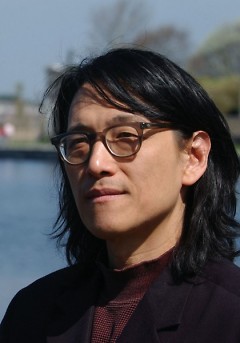
Li-Young Lee /Cuirt International

Li-Young Lee /Cuirt International
For a man whose voice holds such a confident calmness, it’s surprising when Li-Young Lee reveals his own dissatisfaction with his poems.
“I come to the page everyday to write, and my attitude is, is there a word from the Lord? If God doesn’t write the poem, it’s just writing. I don’t want to be a writer, I’m not interested in being a poet. My real obsession is with the Divine,” Lee explains.
This past Saturday morning, at Calvin College’s Festival of Faith and Writing, Lee described his life as a world renowned poet to an audience of writers, teachers, editors and publishers. He read aloud two of his poems, and responded to questions about each.
Prior to reading the poem “Have you prayed,” Lee explained that as a boy, every day when he woke in the morning his father would ask him, “Have you prayed?” to which Lee always responded with a yes- which was usually a lie. As he got older, he was struck with a great sense of guilt over repeatedly lying to his father, and wrote the poem in response to the guilt. He claims he is unsatisfied with it though, as he doesn’t believe it contained the word of God. He explained that he’s “trying to create that voice that Christ created in him,” and believes that if there is no divinity in a poem, it is too full of ego.
Lee then read a poem entitled “Immigrant Blues,” after which he explained “This one is too much me-me without God.”
Despite his own dissatisfaction with his work, Li-Young Lee has been the winner of Lannan Literary Award, the American Book Award, and a Guggenheim Foundation fellowship, and has published several books of his work.
Lee describes poetry as “a musical score of the human voice.”
“All speech is done with the outgoing breath. There is a thing called inversive speech. It’s done in certain parts of China, where a grandmother, they breathe in when they talk. But only when telling secrets to granddaughters...
"When you breathe in, that’s the life-giving breath. your body is filled with oxygen, nutrients, nitrogen, whatever else. Your blood is filled with these nutrients. There is scientific proof that your bones get harder when you inhale. There are little spaces in your bones, and those spaces actually disappear when you inhale. Your bones get harder, your muscles gets flush, your skin gets flush, so you’re full of life. As you breathe out, your bones actually soften, your muscles get flaccid, nutrients begin to leave the blood. So that’s the dying breath. All speech is born on the dying breath. So that when you look at a poem, it is actually a musical score for the dying breath, because it’s a musical score of speech...The nature of speech is this: I breathe in, I take a big breath, I’m full of life...As I begin to talk, my meaning gets more and more disclosed, more and more divulged. There’s more and more meaning, but less and less breath. So that verbal meaning increases in opposite ratio to vitality, it’s kind of a tragic state of affairs...
"Poets try to ransom the dying breath by packing as much meaning and information into speech. And that’s why poetry is so dense with meaning.”
Lee was born in Jakarta, Indonesia in 1957. Following a year his father spent as a political prisoner, Lee traveled with his family through Hong Kong, Macau, and Japan, until they settled in America in 1964. Lee currently resides in Chicago with his wife and two children.
The Rapidian, a program of the 501(c)3 nonprofit Community Media Center, relies on the community’s support to help cover the cost of training reporters and publishing content.
We need your help.
If each of our readers and content creators who values this community platform help support its creation and maintenance, The Rapidian can continue to educate and facilitate a conversation around issues for years to come.
Please support The Rapidian and make a contribution today.